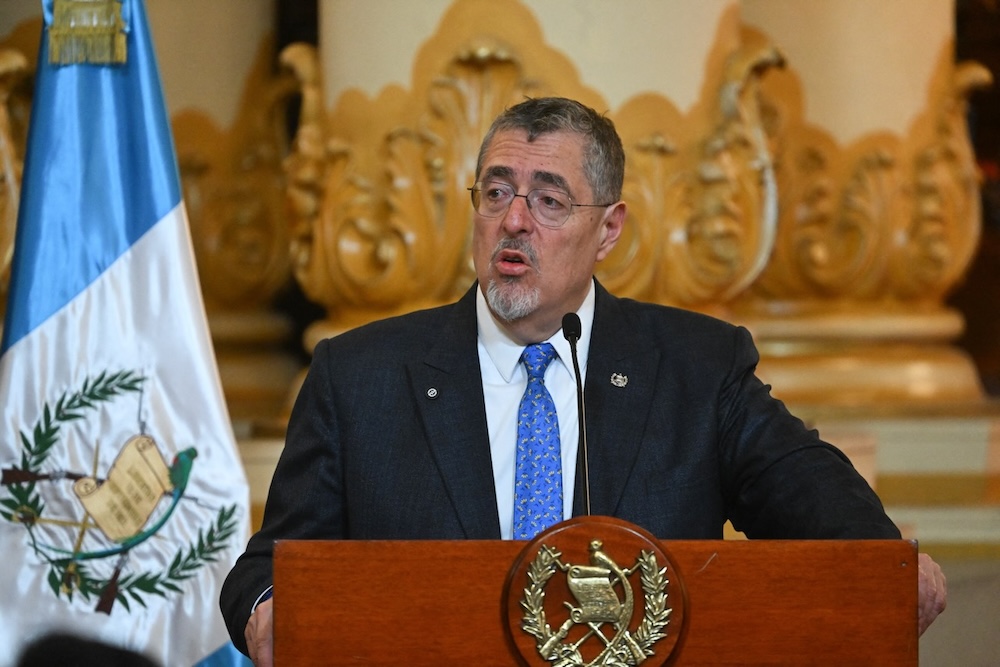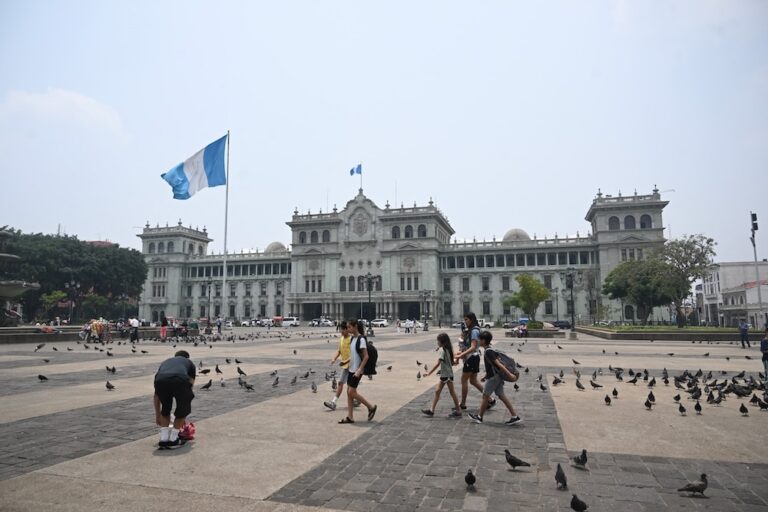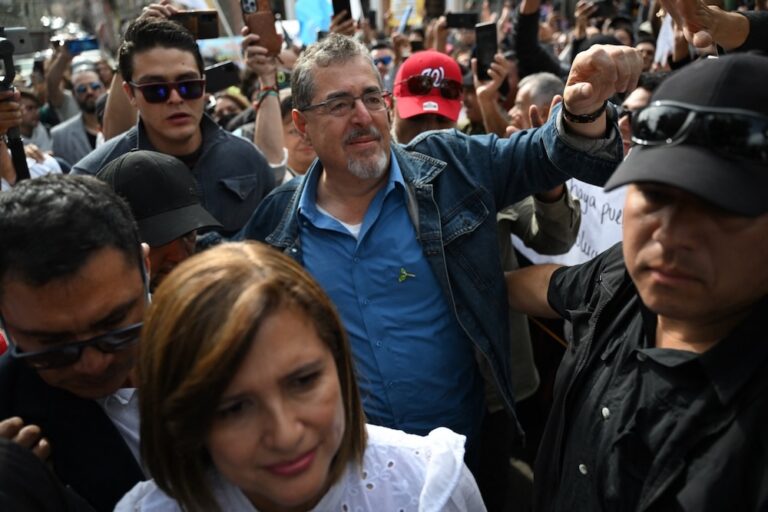Despite the enormous challenges ahead, Guatemalan citizens, civil society, and democratic governments can remain cautiously hopeful about Arévalo’s second year in office.
This statement was originally published on freedomhouse.org on 16 January 2025.
Bernardo Arévalo overcame tremendous obstacles to become Guatemala’s president, but the old guard that tried to derail his campaign is now retaliating against his government to protect their own corrupt network.
It has been more than one year since Bernardo Arévalo, an outsider who ran a progressive, anticorruption, and antipoverty campaign, won Guatemala’s August 2023 presidential runoff election. Since winning, Arévalo faced several attempts to have the results overturned but nevertheless took office in January 2024 after steady protests by Indigenous movements and widespread international support and pressure. Arévalo also outlasted a nearly 10-hour delay and several last-minute attempts by the outgoing Congress to obstruct a constitutionally mandated transfer of power.
President Arévalo has faced fierce resistance since taking his post. His supporters, including Indigenous groups, worry that the opportunity for meaningful change may be lost, while those linked to deep-rooted interests and corruption are fighting to preserve their advantage.
A tug of war in year one
To be sure, President Arévalo has made some progress on efforts to clean up public contracting, push meritocracy in the cabinet, and restore Guatemala’s image on the world stage. Arévalo’s administration has remained relatively popular as it has embarked on its agenda. And observers hope that the administration will keep Guatemala in the democratic column of nations. Locally and globally, Arévalo is perceived as a democratic champion.
Some early developments are certainly positive. International assistance and investments have poured into Guatemala since Arévalo took office. Walmart announced a multiyear investment plan last May. Last September, the US Agency for International Development added Guatemala to its Democracy Delivers Initiative and pledged support for projects focusing on issues like employment and rural development. Last October, the Guatemalan Congress selected 13 new Supreme Court judges and 156 appellate judges, though some of the successful candidates were linked to corruption and the process was marred by opacity. Also last October, Arévalo was able to celebrate a judge’s decision to release El Periódico founder José Rubén Zamora to home arrest. Zamora was wrongfully detained in July 2022 for alleged money laundering, obstruction of justice, and use of falsified documents (what he actually did was report on corruption and work to keep the outlet afloat). Zamora was ordered back to prison the month after his release but the Supreme Court reversed that order only on Monday, allowing him to remain at home.
But the attempt to send Zamora back to prison is a sign that the broader, deeply troubling trend of criminalizing political opponents and critics persists. And Arévalo’s first year in office has been marked by other challenges, too. So far, he has faced more than a dozen impeachment requests and at least six attempts by Attorney General María Consuelo Porras to strip his immunity from prosecution. The Arévalo-led Movimiento Semilla (Seed Movement), whose contingent of lawmakers is too small for it to easily enact a legislative agenda, survived a judge’s 2023 order to suspend it. But in late November 2024, the same judge issued an order demanding the Supreme Electoral Tribunal cancel the party’s legal status, prompting an appeal.
Arévalo’s one presidential term – he is constitutionally prohibited from seeking another – ends in January 2028, and the first round of the next election is due in June 2027. The narrow window of opportunity to bolster democratic rule and dismantle a complex web of corruption is closing.
The pact of the corrupt
Powerful political, economic, military, and criminal groups maintain considerable influence in Guatemala, despite Arévalo’s election. The so-called “Pacto de Corruptos” is an entrenched network of criminal enterprises and political and business elites that expanded their use of state power after a UN-backed anticorruption commission was shut down in 2019. They infiltrated not only the government, but the courts, the electoral authorities, and crucially, the powerful office of the attorney general. That pact is using a still-captured judiciary to sustain its antidemocratic response to Arévalo’s administration.
A central node of this network is the office of Attorney General Consuelo Porras and her deputy, Rafael Curruchiche, who both faced sanctions by the United States for obstructing justice and shielding political allies. Consuelo Porras also benefits from a 2016 law prohibiting the president from firing the attorney general. She was reappointed in 2022 by then-President Alejandro Giammattei – a politician who is linked to the pact, who retaliated against El Periódico and Zamora’s stories on corruption, and was barred from entering the United States over allegations of misconduct. Consuelo Porras, who is subject to US and European Union (EU) sanctions, still has absolute power to disrupt Arévalo’s agenda and could attempt to remove him from office before her own term expires in 2026.
An opportunity for resilience in year two
President Arévalo represents a significant departure from the corruption and self-aggrandizement that characterized his predecessors. But a principled leader operating in a corrupt system without independent checks and balances has a challenging road ahead, especially when corrupt actors seek to defend their turf and retain their power. The attorney general has nearly two years to target the pact’s opponents, including Arévalo. Guatemala’s Indigenous peoples, who were key to securing his inauguration, remain engaged with his administration but are growing unhappy. Guatemala’s transactional politicians are, for now, supporting Arévalo but are also pondering his prospects. And the ground for Arévalo will shift further when a new administration takes office in Washington this month, with its own foreign policy priorities.
On the international stage, Arévalo continues to solicit investments and leverage his allies’ support to maintain his democratic grip on office. As Arévalo will likely face further attempts to derail his agenda, the continued assistance of committed allies may prove essential during his second year. The EU, which openly criticized undemocratic attempts to keep Arévalo from office, sought to strengthen bilateral ties soon after his inauguration and should continue doing so. Washington, for its part, could encourage more private investment and stand beside its development partners as a way to bolster security and prosperity in Guatemala.
In a hemisphere and a world where authoritarians and populists are consolidating power, Arévalo’s victory and inauguration felt hopeful and refreshing. Despite the enormous challenges ahead, Guatemalan citizens, civil society, and democratic governments can remain cautiously hopeful on Arévalo’s second year in office.



